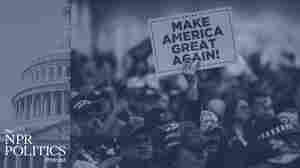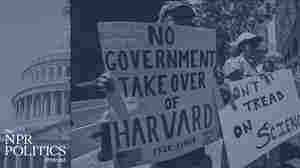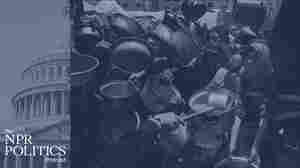President Donald Trump takes the oath of office Jan. 27, 2017, on Capitol Hill in Washington. Jim Bourg/AP hide caption
Political wonks - get wonkier with The NPR Politics Podcast+. Your subscription supports the podcast and unlocks a sponsor-free feed. Learn more at plus.npr.org/politics


The NPR Politics Podcast
From NPR
Every weekday, NPR's best political reporters are there to explain the big news coming out of Washington and the campaign trail. They don't just tell you what happened. They tell you why it matters. Every afternoon.
Political wonks - get wonkier with The NPR Politics Podcast+. Your subscription supports the podcast and unlocks a sponsor-free feed. Learn more at plus.npr.org/politics
Most Recent Episodes
The Department of Justice seal is seen during a news conference Thursday, Dec. 5, 2024, in Memphis, Tenn. George Walker IV/AP hide caption
In the federal court system, law clerks find little recourse for bullying and abuse
In the federal court system, law clerks find little recourse for bullying and abuse
Los Angeles Mayor Eric Garcetti speaks during a ceremony to award Mexican actor/singer/radio personality Angelica Vale a star on the Hollywood Walk of Fame, Thursday, Nov. 10, 2022, in Los Angeles. Chris Pizzello/AP hide caption
Looking The Other Way, Part 1: A powerful Democrat and a #MeToo scandal
Looking The Other Way, Part 1: A powerful Democrat and a #MeToo scandal
President Trump speaks from the East Room of the White House in Washington, Saturday, June 21, 2025, after the U.S. military struck three Iranian nuclear and military sites, as Vice President JD Vance, Secretary of State Marco Rubio and Defense Secretary Pete Hegseth listen. Carlos Barria/Pool, via AP hide caption
The Los Angeles City Hall building is seen in downtown Los Angeles Wednesday, Jan. 8, 2020. Damian Dovarganes/AP hide caption
A Trump supporter holds up a MAGA sign during a rally for then-Republican presidential candidate and former President Donald Trump, in Green Bay, Wis., on April 2, 2024. Mike Roemer/AP hide caption
Protestors gather outside the Moakley Federal Courthouse in Boston, where Harvard University appeared to challenge $2.6 billion in funding cuts by the Trump administration, on July 21. Charles Krupa/AP hide caption
Palestinians struggle to get donated food at a community kitchen, in Gaza City, on July 26, 2025. Abdel Kareem Hana/AP hide caption
Jaqueline Benitez pushes her cart down an aisle as she shops for groceries at a supermarket in Bellflower, Calif., on Feb. 13, 2023. A preschool teacher, Benitez depends on California's SNAP benefits to help pay for food. Allison Dinner/AP hide caption
States fight federal effort to collect personal data of food stamp users
States fight federal effort to collect personal data of food stamp users
Susana Lujano, left, a dreamer from Mexico who lives in Houston, joins other activists to rally in support of the Deferred Action for Childhood Arrivals program, also known as DACA, at the U.S. Capitol on June 15, 2022. J. Scott Applewhite/AP hide caption









